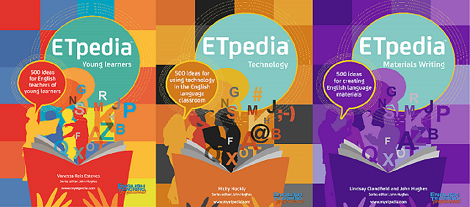10 questions for an ELT editor
ELT books have the author’s name on the front cover but a key person you often don’t get to hear about in the writing process is the editor. Penny Hands is one of the editors who has worked on the ETpedia series so we asked her ten questions to find out more about the work of an ELT editor. 
Penny will also be giving a talk about her research into the writer–editor relationship for the Materials Writers Special Interest Group at the IATEFL conference in Glasgow on April 3rd. See here for details.
1 Who are you and what do you do?
I’m Penny Hands and I’m a freelance ELT editor. I’ve worked for the last 20 years as a lexicographer, compiler of language teaching reference books and materials, and editor on ELT materials and teacher resource books. I’m a regular editor with Pavilion, and with ELT self-publishers at the round (an independent ELT e-publishing collective). My interest lies in how best to achieve the shared goal of making a book the best it can be, through effective communication, collaboration and a strong understanding of the field and the market.
2 What is your involvement in the ETpedia series?
I’ve edited two of the ETpedia books. I worked with Vanessa Esteves on ETpedia Young Learners and with Nicky Hockly on the forthcoming ETpedia Technology, in both cases benefitting from the advice and expertise of John Hughes, series editor.
3 How did you become an ELT editor?
After a four-year stint teaching English in France, I went to the University of Edinburgh to do a Masters in Applied Linguistics. After graduating from there, I started working in the ELT department of Chambers Harrap in Edinburgh – as a dictionary editor. That’s where I learnt the publishing ropes. We also produced grammar and other language reference materials, so I gained experience in a variety of areas. In 2000, I went freelance, first as a lexicographer. I got my first ‘gig’ editing teacher resources when Macmillan asked me to co-edit Scott Thornbury’s A–Z of ELT. Jill Florent was the main editor and she became something of a mentor to me. I’m very grateful to both her and Karen White (who was then at Macmillan) for all their support on that first big editing job.
4 What was your teaching background before that?
I first worked as an English teacher in France (Marseille and Paris) for four years, and then with mixed L1 groups – mainly European and Asian – on summer schools in the UK.
5 How much of that past teaching experience do you draw on for editing?
I think much or most of what I experienced underpins what I do now. I draw on both linguistic and contextual experience. For example, I have a reasonably good handle on the type of language issues learners with Latinate first languages have; also, teaching Chinese learners gave me an invaluable insight into not only the type of linguistic problems these learners have, but also the cross-cultural issues they encounter, especially in academic contexts.
6 What skills and qualities are important for an editor?
Contrary to what people might think, it’s not just an ability to nit-pick and wield a red pen (although I’ll admit to having occasionally been accused by my nearest and dearest of excruciatingly tedious pedantry). Nor is it all about being the ‘grammar police’. For me, being a good editor is very much about empathy – both with the author and the potential reader. First, a good editor will create a relationship of trust and co-operation with the author through good communication skills and warmth, and an understanding of the market, the topic and a strong sense of what the author is trying to achieve. Keeping a close eye on the brief and gently steering the author in the right direction also requires diplomacy. Finally, the editor needs to put herself into the shoes of the reader. For this, a good knowledge of the target audience is necessary. For example: Will readers understand the terminology used? Will those who are less proficient in English be confused by a particular turn of phrase? Are the activities relevant to young/teenage/adult learners?
7 How much do you think an editor affects the actual content of a book?
That depends on what sort of shape the manuscript is in when he or she gets it. An editor will use their knowledge of the target audience, the topic and the aims of the book to suggest any additions, deletions or revisions.
They check that the author’s copy gets the content and ideas across as well as possible, that it avoids ambiguity, that it makes points clearly and in the best order, and that it doesn’t make unsupported claims. Finally, they check spelling, punctuation and grammar.
Occasionally, a manuscript comes in that goes a long way towards ticking all the boxes: it follows the brief, it speaks to the target audience clearly, and the arguments flow easily and naturally. Even then, though, it is important for someone else to see the text through the eyes of the reader – to check for any assumed knowledge, potential ambiguities or inconsistencies, as well as to look out for the odd typo or punctuation error.
8 You have done some research into the editor–author relationship. Can you tell us more about it?
Yes – I’d been thinking about doing this for quite some time before I took the decision to look into the topic in more detail. I’d always used my common sense and in-built sensitivity when editing someone else’s work, building up a good relationship from the start and working hard to keep things that way while helping the author to get their message across as well as possible. But a couple of years ago, I went to a talk given by an author from the round, and was taken aback to hear him say that he cried when he got his first feedback from his editor. It seemed, from the response in the room, that he wasn’t alone.
So the question I started to ask myself was this: Is that an inevitable part of the process until the author develops a thicker skin? Is it normal, after all, after we’ve worked and re-worked our masterpiece, to feel personally devastated to get it back covered in comments, queries, suggestions, etc.?
Or is there much more we can do as editors to make the process run more smoothly?
I like to think I’ve been even more careful, since this revelation, to smooth the process, but I was sure I still had plenty to learn, so I decided to carry out the survey in which I asked authors and editors about their experiences (both positive and negative) of working in an author–editor relationship. And wow, what a response I got!
9 What was one of your key findings?
Plenty of positive experiences and useful advice came out of the survey. However, one key finding was that most authors have had at least one really bad experience working with an editor, and that this could have been avoided if the correct procedures had been in place.
It seems that while a lot of great work is being done, there is an important role for in-house or freelance mentors. As editorial staff are axed and deadlines become increasingly squeezed, the role of the mentor is becoming increasingly obsolete. New editors are having to feel their way; their work isn’t always checked and they are missing out on the training and support they need. Naturally, this is having an effect on authors.
I’m currently extending my research a little to find out from in-house commissioning and managing editors how they think we can move forward so that authors feel supported if and when things start to go awry.
10 What advice would you give someone who is thinking of becoming an ELT editor?
I’d advise getting at least two years’ (ideally more) teaching experience, if possible with students of a range of L1s. Do a Master’s degree in TEFL, Applied Linguistics or similar. If you are planning to work freelance, get some experience working in-house in various different departments, in both print and digital areas.
Don’t misguidedly think of yourself as a ‘guardian of the language’, wielding a red pen and tutting at minor grammatical and spelling errors. Instead, embrace your relationship with the author, respect his or her aims and voice, and make sure you are well-informed on the topic of the book and the needs of the target audience.
Keep up to date by following ELT bloggers, reading articles and books, and talking to practitioners (online or face to face). Finally, read plenty of everything – fiction and non-fiction – both for your own enjoyment, and to develop your sense of how best to communicate ideas through the written word.
If you are looking to create your own materials, either for personal use or you are looking for some advice on creating publishable work, then take a look at ETpedia Materials Writing. You can also take a look at ETpedia Young Learners and ETpedia Technology.

Comments
Write a Comment
Comment Submitted